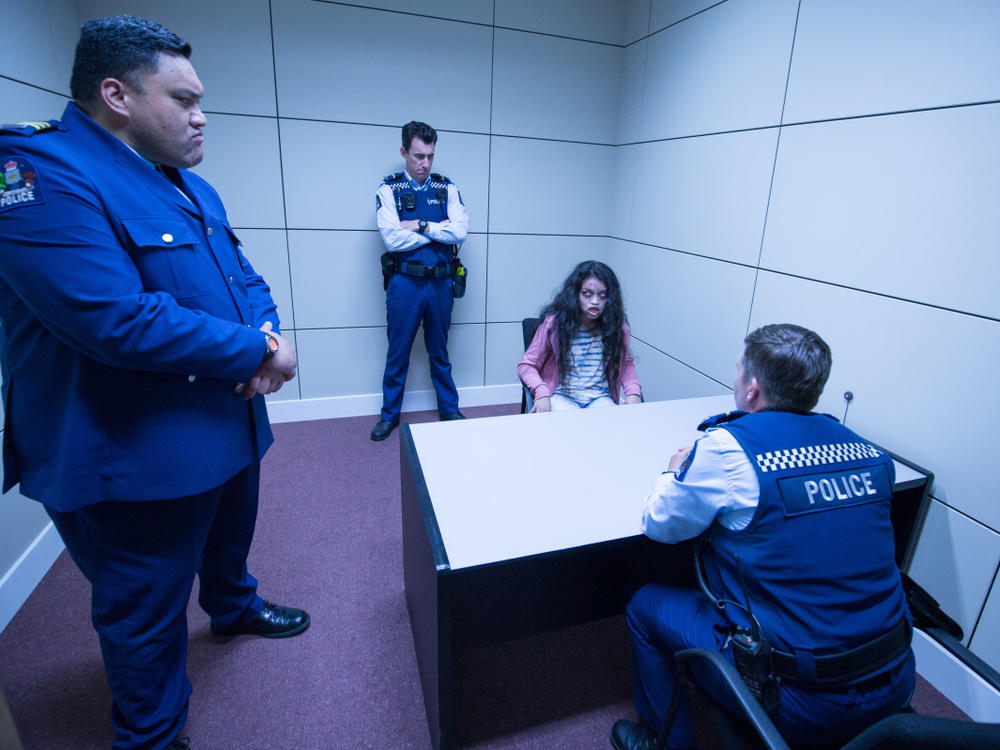Section Branding
Header Content
In 'Wellington Paranormal,' Clueless Kiwi Cops Meet Dryly Deadpan Demons
Primary Content
On the excellent, very silly yet dry-as-vampire-dust series What We Do in the Shadows, a bunch of vampire housemates are constantly followed by a documentary crew capturing their mundane everyday (everynight, technically) existence. WWDITS hews closely to the established, familiar mockumentary format — handheld camerawork, a sense that the subjects of the series are only too aware of how they're being perceived, and frequent cutaways to "talking head" interviews with isolated characters.
Most viewers have so internalized the narrative rhythms of mockumentary that they no longer notice them, even on a series starring characters who regularly turn into bats and drink the blood of the living between their prosaic roommate squabbles.
Even so, asking viewers to suspend their disbelief about, say, the staff disputes at a Scranton paper company, for example, remains a much lighter lift than asking them to blithely accept that a human camera crew would be freely admitted to a secret witches' ritual intended to drain the semen of vampires. There's reality TV, and then there's "reality" TV.
With the CW's Wellington Paranormal, the team behind What We Do in the Shadows the series, and the 2014 movie it's based on (made up of Taika Waititi and Jemaine Clement) has struck upon an ingenious way to erase any possible disconnect between unreal events and and the dictates of reality filmmaking: They simply graft their beloved horror-comedy elements and deadpan humor onto the structure of that most familiar, formulaic and stolid of reality shows: COPS.
If you've seen even a single episode of COPS, you know the drill. Between shaky-cam footage of real-life arrests, police officers deliver self-aggrandizing speeches to the camera thick with the pseudo-militaristic jargon of the profession. They pontificate about public safety, attempt to justify their every action, demonize those they've arrested and generally strive to pass themselves off as members of an elite brotherhood that is singlehandedly preventing the republic from descending into chaos.
Now imagine all of that chest-puffing bluster, but with demons. And werewolves. And vampires. Et cetera.
There's a seamlessness to Wellington Paranormal's depiction of self-serious cops bloviating about the need to protect the public from the scourge of recreational drugs while, behind them, just out of focus, a demon-possessed young woman skitters across the ceiling.
In the pilot, Officers Minogue (Mike Minogue) and O'Leary (Karen O'Leary) — who originated their roles in the 2014 movie — get drafted into the Paranormal Division of the Wellington Police when their true-believing Sgt. Makka (Makka Pohatu) leads them into his ultra-secret office (read: storage closet) behind a bookcase at HQ. Makka may be a font of occult knowledge, but Minogue and O'Leary prove hopelessly slow on the uptake, treating their every brush with the uncanny and otherworldly — from aliens to zombies — with precisely the same dull-eyed officiousness with which they'd write up a jaywalker.
This conceit — the extraordinary intersecting with the very, very ordinary — drives each episode, but the show's three leads find different ways to attack it. O'Leary plays her character as someone possessed of a creeping awareness of just how incompetent she's coming across on camera, while Minogue's slightly dimmer cop is full of blithe and entirely unearned confidence. As their supervisor, Makka Pohatu exudes a knowing, seen-it-all swagger that masks a clueless, seen-precisely-nothing cowardice, once he actually faces off with the uncanny.
Like What We Do in the Shadows, Wellington Paranormal strikes and manages to maintain a perfectly consistent, straight-faced tone amid all its dumb jokes and bumbling slapstick gags. Unlike WWDITS, however, Wellington Paranormal follows a monster-of-the-week structure, which threatens to turn its signature tonal consistency into a dutiful sameness.
But given that the series is already on its third season in its native New Zealand, with a fourth now in post-production, there's every reason to hope that this perfect synthesis of horror, comedy and bitingly satiric copaganda will find a way to keep its premise fresh, come hell or high water.
Though hell, of course, seems the much more likely option.
Copyright 2021 NPR. To see more, visit https://www.npr.org.

